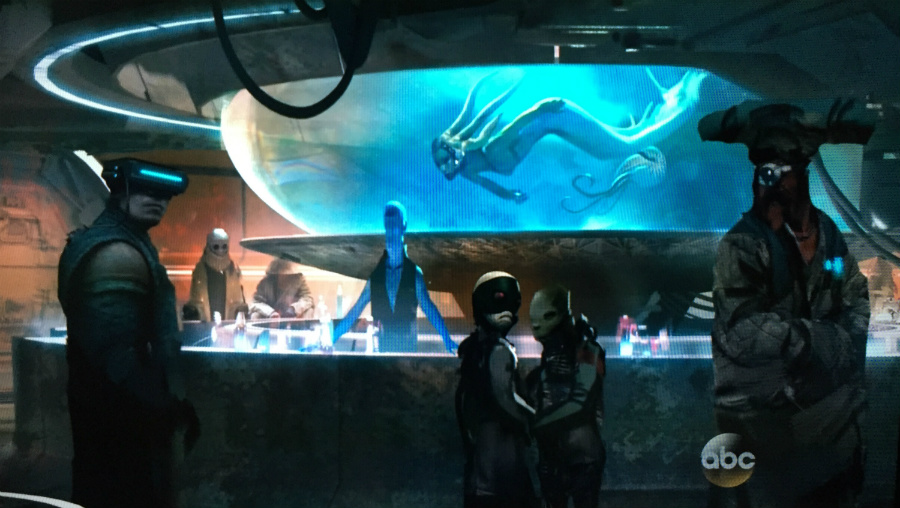Best of the Week: Getting Ready for the Oscars, First Look at the New 'Pete's Dragon' and More
The Important News
Star Wars Mania: Disney released more concept art and other details on Star Wars Land. Star Wars: Episode VIII is fighting off set spies with drones. Star Wars: The Force Awakens will hit iTunes next month.
Marvel Madness: Crossbones made an official debut in new images from Captain America: Civil War. Finn Jones is Marvel’s Iron Fist for Netflix.
DC Delirium: Justice League – Part 1 received a shooting start date. Batman v Superman: Dawn of Justice will have an R-rated version available on video. Batman v Superman: Dawn of Justice might have received rewrites from Ben Affleck.
Franchise Fever: Demian Bichir joined the cast of Alien: Covenant.
Sequelitis: Pacific Rim 2 will move ahead with director Steven S. DeKnight. Brant Daugherty will play Anastasia’s bodyguard in Fifty Shades Freed. Lin-Manuel Miranda may co-star in the Mary Poppins sequel. Both Crouching Tiger, Hidden Dragon 3 and Cloverfield 3 might happen.
Remake Report: Michael B. Jordan will star in a new version of The Thomas Crown Affair. James Mangold will direct a prequel reboot of a new 20,000 Leagues Under the Sea.
Casting Net: Emily Ratajkowski will co-star in In Darkness. Jon Bernthal joined the cast of Baby Driver. Tyler Sheridan will star in Steven Spielberg’s Ready Player One.
Reel TV: Amy Adams will star in the TV adapation of Gillian Flynn’s Sharp Objects. Jean-Claude Van Damme will star in a comedy series for Amazon.
New Directors/New Films: Joe Wright will direct the supernatural thriller The Ruins. Ava DuVernay will direct Disney’s adaptation of A Wrinkle in Time. Chris Weitz will helm a movie about infamous Nazi Adolf Eichmann.
Writers Block: Dan and Kevin Hageman are now writing Guillermo del Toro’s Scary Stories.
First Look: Zac Efron’s enlarged muscles made a big splash in a new Baywatch image.
Box Office: Deadpool broke more records last weekend. And it became the biggest X-Men movie.
Celebrating the Classics: FerrisFest, honoring Ferris Bueller’s Day Off, will be held in Chicago in May.
Tie-in Time: Morgan Freeman’s voice is now available for your GPS system. Fake tie-in product Slusho will return in 10 Cloverfield Lane.
Awards Season: Moviegoers chose The Revenant as the favorite to win Best Picture.
The Videos and Geek Stuff
New Movie Trailers: Pete’s Dragon, Alice Through Looking Glass, Kill Your Friends, Precious Cargo, I Am Wrath and The Light Between Oceans.
Clip: Rise of the Legend.
Behind the Scenes: The makers of The Big Short explain how to make sense of financial nonsense.
See: Deadpool‘s last-minute Oscar campaign ad.
Watch: Deadpool answers fans questions.
See: Mysterious Spaceballs sequel ads posted in NYC subways.
Watch: J.J. Abrams fixes more franchises in a parody video.
See: Best Picture nominees aligned with which presidential candidate. And Best Picture nominees told as emojis. And kids explain what they think the Best Picture nominees are about.
Watch: Parodies of Best Picture nominees The Martian and Mad Max: Fury Road. And a parody of Spotlight.
See: Every Leonardo DiCaprio movie in one supercut.
Watch: An in-depth profile of character actor Crispin Glover.
See: A first look at the new Universal Studios ride based on Kong: Skull Island.
Watch: A celebration of the Coen Brothers and a comparison between the Fargo movie and show.
See: This week’s best new movie posters.
Our Features
Oscar Nominee Guide: Where and when you can find this year’s Oscar nominees On Demand. Geeky recommendations for old movies starring current Oscar nominees.
Sci-Fi Movie Guide: Revisiting Star Wars: the Force Awakens at the end of its theatrical run.
Comic Book Movie Guide: About that R-rated Batman v Superman cut.
Filmmaker Guide: An appreciation of Triple 9 director John Hillcoat.
Foreign Film Guide: Why you need to know about Stephen Chow’s The Mermaid.
Home Viewing: Here’s our guide to everything hitting VOD this week. And here’s our guide to everything hitting HBO Now next month. And here’s our guide to everything hitting Netflix next month.
and
MORE FROM AROUND THE WEB:
This entry passed through the Full-Text RSS service – if this is your content and you’re reading it on someone else’s site, please read the FAQ at fivefilters.org/content-only/faq.php#publishers.



